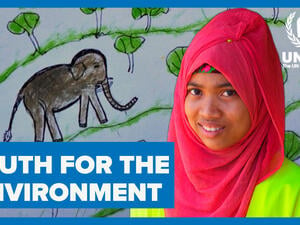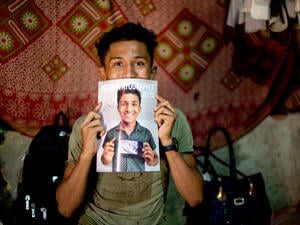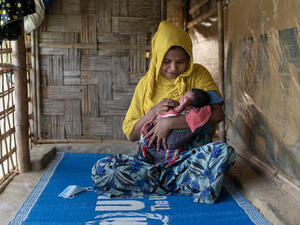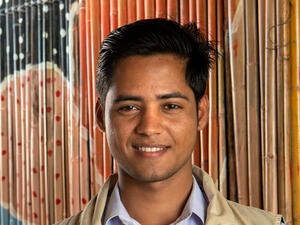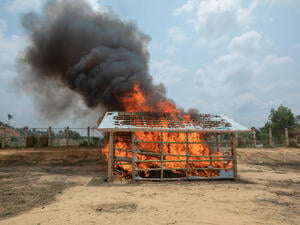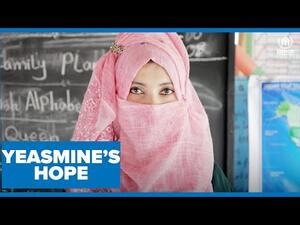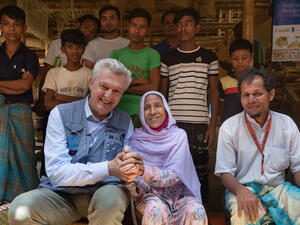UNHCR's protection chief completes visit to Myanmar with call for more support to Rakhine state
UNHCR's protection chief completes visit to Myanmar with call for more support to Rakhine state

Assistant High Commissioner for Protection Volker Türk speaks with an elderly woman in a Rohingya village near Maungdaw, northern Rakhine State, Myanmar, on 12 July 2015.
YANGON, Myanmar, July 16 (UNHCR) - A top official of the UN refugee agency responsible for protection has called for more concerted support to resolve the plight of displaced people in Myanmar and those with undetermined citizenship.
UNHCR's Assistant High Commissioner for Protection, Volker Türk, made his remarks at the end of a five-day mission to Myanmar on Monday during which he visited Yangon and the capital Nay Pyi Taw, as well as Sittwe and Maungdaw in Rakhine state.
Rakhine state is one of the least developed in the country. It is home not only to internally displaced people, but also to an estimated 1 million people of undetermined citizenship -- predominantly Rohingya living in the state's northern townships.
This population is affected by restrictions on freedom of movement and access to livelihoods and services such as health and education.
Türk heard directly from the affected populations in Rakhine state, where 140,000 people are still internally displaced after the outbreak of inter-communal violence three years ago.
In a positive development, when breaking the Ramadan fast together with Rakhine and Rohingya community leaders in Maungdaw, he was told that while challenges remain in building trust, the communities have a long history of co-existence.
"We have been living together since before Maungdaw town existed," said one Rohingya leader. His comment was then affirmed by a Rakhine representative.
Travelling to a small village an hour's drive from Maungdaw, Türk saw first-hand the impact of restrictions on the Rohingya population and the harmful effects of their lack of rights associated with citizenship. "Local orders" are in place that prevent them from moving easily from one village to another, greatly limiting their livelihoods. They also lack access to higher educational opportunities. Since June 2012, Rohingya students have been unable to attend Sittwe University - the only university in the state.
In Nay Pyi Taw, he held discussions with U Khin Yi, Minister for Immigration and Population, and other government officials and parliamentarians.
Following up on the issues raised in Bangkok in late May at a regional meeting on irregular migration in the Indian Ocean, Türk discussed the recent "boat crisis" in the region and the long-term situation in Rakhine state. He reiterated UNHCR's readiness to assist all governments in the region, including that of Myanmar, to address the movements of people from Bangladesh and Myanmar.
At the end of his visit, the Assistant High Commissioner shared his findings at a briefing with diplomats and representatives of international organisations in Yangon.
Describing the regional dimension of the maritime movements in the Bay of Bengal and Andaman Sea, he emphasised that in order to find solutions, it is key to work with all of the communities, together with the authorities, to promote peaceful co-existence in the Rakhine state.
"The future of the country depends on the future of all of its composite parts," Türk said at the briefing, noting that everyone in the country should have the opportunity to benefit from the transformation currently taking place.
By Kasita Rochanakorn in Yangon, Myanmar

